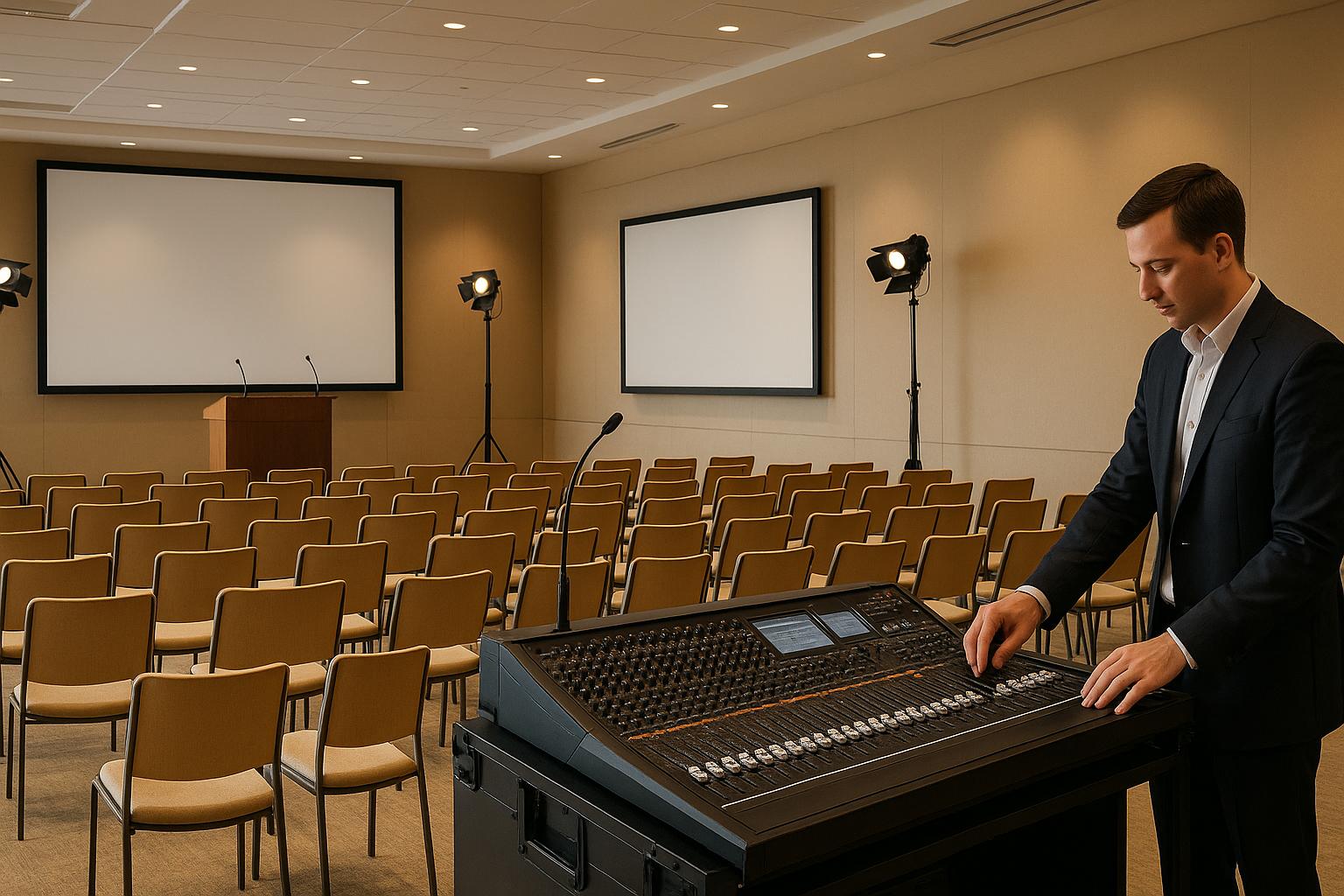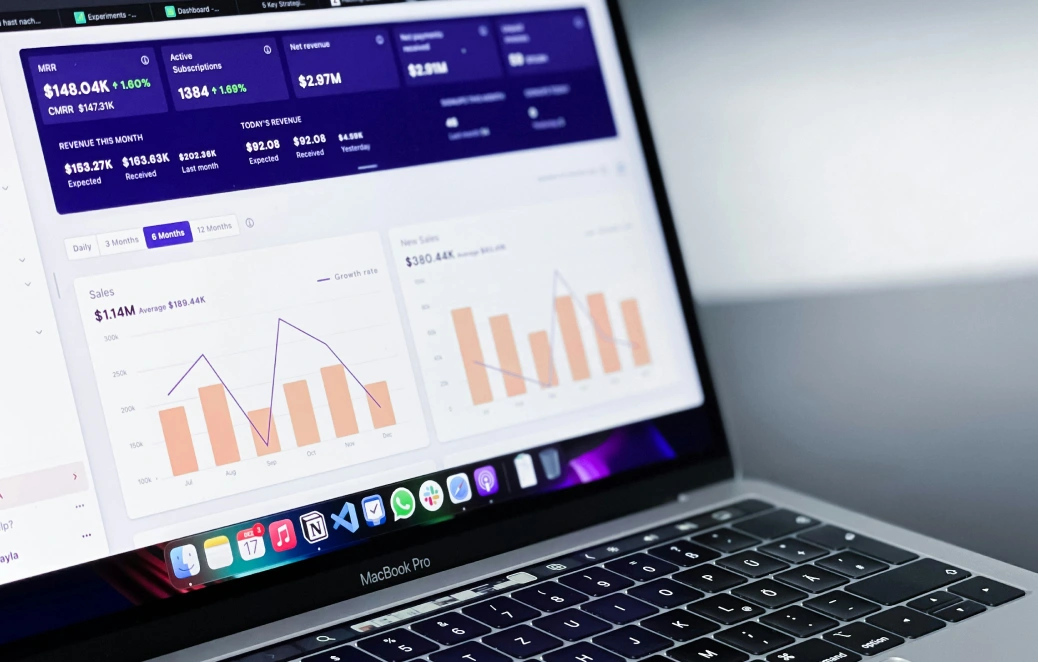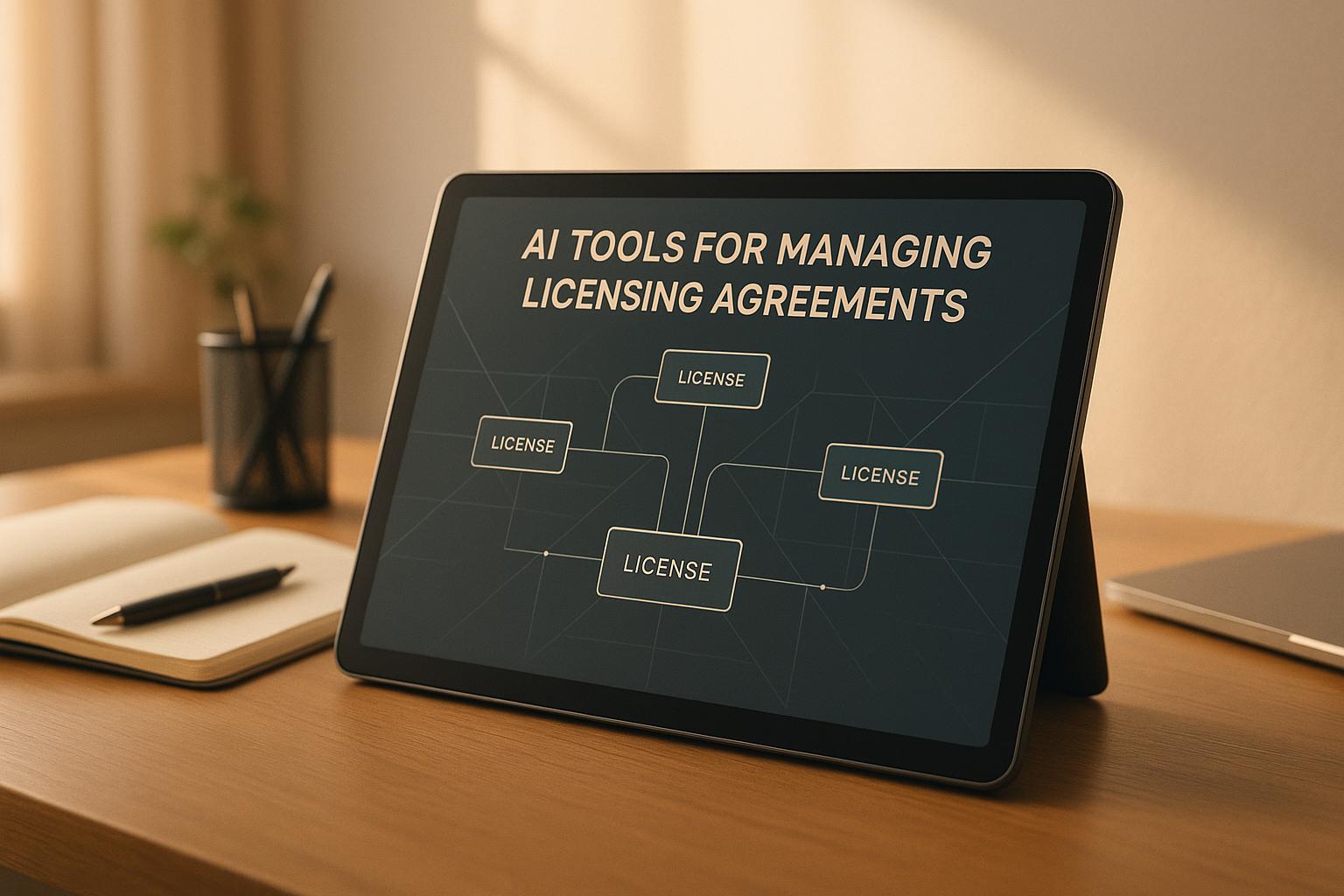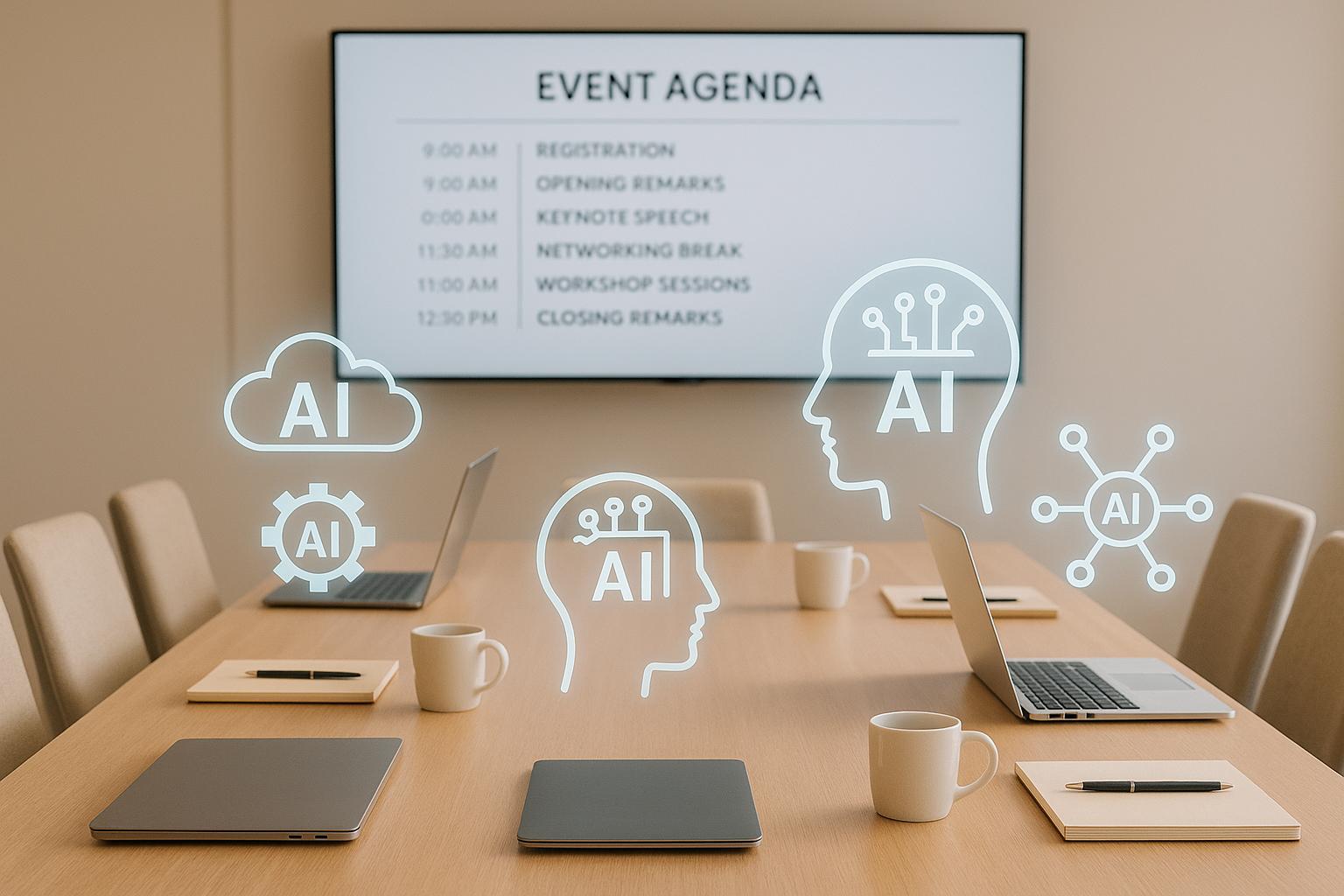How do I choose the right AV partner for a large-scale meeting?

Chief Executive Officer

When planning a large-scale event, your AV partner can make or break its success. Here's how to choose the right one:
- Understand Your Needs: Define your event's goals, audience size, and format (in-person, hybrid, virtual). This helps determine your AV setup, such as microphones, screens, or live streaming.
- Set a Budget: Allocate funds for audio, visuals, lighting, staging, and labor. Include a contingency for last-minute changes or challenges.
- Evaluate Expertise: Look for a partner with experience in similar events. Review case studies, certifications (e.g., CTS), and client references to ensure reliability.
- Check Services: Opt for a full-service provider who handles planning, setup, on-site support, and post-event reporting. This reduces miscommunication and ensures smooth execution.
- Assess Technology: Ensure they have up-to-date equipment, scalable solutions, and familiarity with modern tools like AI analytics or hybrid event platforms.
- Prioritize Reliability: Confirm they have contingency plans, on-site support, and transparent pricing. A detailed contract with clear deliverables is essential.
Choosing the right AV partner ensures your event runs smoothly, leaving a lasting positive impression on your audience.
How to Source an A/V Vendor for Your Next Event - Part #2: My Evaluation Process - Logan Clements
Understanding Your Event's AV Requirements
Laying out your event's AV needs is essential for shaping both your equipment choices and your budget. Without a clear plan, even the best AV partner might struggle to meet your expectations.
Define Event Objectives and Scope
The purpose of your event should steer every technical decision you make. For instance, a product launch will require entirely different AV setups compared to a training seminar or an investor presentation. Start by identifying what you want attendees to take away from the experience and how AV technology can help achieve that goal.
The format of your event and the level of audience interaction also play a major role in determining your technical needs. A 500-person in-person conference will require a completely different setup than a hybrid event connecting 200 on-site attendees with 1,000 virtual participants. For interactive corporate training, you’ll need microphone systems and engagement tools that align with your event’s structure. On the other hand, a keynote presentation demands crystal-clear audio and visuals that ensure every attendee can follow along.
Consider the event’s flow and how attendees will navigate the space. Are there breakout sessions that need separate AV setups? Will there be transitions between different presentation styles? These logistical details shape your technical requirements and help your AV partner craft a plan that fits your event perfectly.
Once your objectives are clear, it’s time to focus on the specific technical tools that will bring your vision to life.
Identify Key Technical Needs
Your technical needs should align with your event’s strategic goals. Sharing your budget with AV partners can help them provide tiered solutions that fit your financial plan. This ensures that every dollar spent contributes meaningfully to your event’s success.
Audio is one of the most critical elements to get right. Poor sound quality can ruin even the most meticulously planned event. Think about the number of presenters and the style of presentations - whether it’s a one-to-many keynote, a collaborative many-to-many discussion, or a hybrid format. Microphone choices should match these styles. For instance, lecturers might prefer hands-free headworn microphones, while audience Q&A sessions could benefit from handheld wireless mics.
Don’t overlook the impact of room acoustics. Factors like venue size, architectural design, and materials can dramatically affect sound quality. Consulting an acoustics expert might be worthwhile to address potential issues like echoes or sound absorption that could compromise the experience.
Your visual and lighting needs depend on the type of content being presented and the venue’s conditions. For events showcasing detailed data or technical diagrams, high-resolution screens and carefully planned lighting are essential. If you’re live streaming, you’ll need professional-grade cameras and lighting to deliver a polished broadcast.
Staging and presentation areas must also be designed with both the audience and speakers in mind. Elevated platforms, confidence monitors for presenters, and staging that aligns with your event’s branding can make a big difference in the overall experience.
Once you’ve outlined your technical needs, the next step is to allocate a budget that matches your requirements.
Set a Realistic Budget
Start by determining your overall event budget and assigning a specific portion to AV. Break this down into categories like audio systems, visual displays, lighting, staging, labor, and technical support. Don’t forget to include time for setup, testing, and teardown in your calculations.
It’s smart to build a contingency fund for unexpected costs. Venue-specific challenges, last-minute changes, or additional technical needs can quickly add up. Investing in an AV partner that provides on-site support and backup systems can help you avoid costly disruptions. Finally, ask potential partners for detailed pricing breakdowns so you have a clear understanding of what you're paying for and where your money is going.
Evaluating AV Partner Expertise and Services
Once you've outlined your requirements and budget, the next step is selecting an AV partner who brings both experience and a full range of services to the table. The success of a large-scale event often hinges on the expertise of your AV partner. Their skills and services can make the difference between a seamless experience and a technical nightmare. By focusing on your event's unique technical demands, you can find a partner who not only meets but elevates your event's vision.
Review Past Projects and Case Studies
Start by assessing the AV partner’s history of handling events similar to yours. A proven track record offers reassurance that they can manage the complexities of your particular event. Look for examples of events that align with your event's size, format, and industry. Request detailed case studies that highlight their ability to solve problems and execute technical requirements effectively.
Pay special attention to their experience with hybrid events. Successfully connecting in-person and virtual audiences requires specialized skills. Ask for examples where they’ve managed hybrid formats, breakout sessions, and interactive features that are similar to what you need.
It’s also important to understand how they handle challenges. Ask about any issues they’ve faced during past events and how they resolved them. This gives you insight into their ability to stay composed and adaptable under pressure. To dig deeper, request client references from events similar to yours. When speaking with past clients, inquire about the partner’s on-site responsiveness, technical reliability, and their ability to adjust to last-minute changes. Flexibility is key, as large-scale events rarely go exactly as planned.
Alongside their portfolio, technical credentials can further confirm their expertise.
Verify Industry Certifications
Certifications offer concrete proof of an AV partner’s technical knowledge. Check whether key team members hold certifications like the Certified Technology Specialist (CTS) from AVIXA, which requires passing a rigorous exam and ongoing education.
For more complex setups, you might want to see certifications tied to specific equipment manufacturers, such as Crestron, AMX, or QSC. These programs ensure the team has hands-on expertise with the tools you’ll be using.
Additionally, membership in organizations like InfoComm signals a commitment to staying updated on the latest technologies and practices. AV partners who prioritize ongoing training and industry involvement are more likely to bring fresh ideas and cutting-edge solutions to your event.
Don’t forget to verify safety certifications and insurance coverage. Large-scale events involve extensive equipment setups, rigging, and electrical work, so it’s critical that your AV partner adheres to safety standards and carries proper liability insurance. These certifications underscore their ability to deliver reliable and safe AV services that align with your event goals.
Check End-to-End Service Offerings
Opt for a partner who can handle every stage of the AV process, from pre-event planning and design to equipment setup, on-site support, and post-event reporting. A full-service provider simplifies communication and ensures accountability. When one team manages everything - from venue surveys to teardown - you’re less likely to encounter miscommunication or unexpected issues. This streamlined approach often leads to better cost control and smoother execution.
Make sure your partner offers comprehensive on-site support, including rehearsal assistance for presenters. Large-scale events often feature multiple speakers, each with varying levels of technical comfort. A reliable AV partner can provide tools like confidence monitors, teleprompters, and hands-on guidance to ensure every presentation goes smoothly.
Given the rise of virtual components in corporate meetings, verify that your AV partner is well-versed in live streaming and virtual event capabilities. They should have experience with professional-grade broadcast equipment, streaming platforms, and the infrastructure needed to deliver high-quality virtual experiences. This includes understanding bandwidth needs, having backup streaming solutions, and incorporating interactive features for remote participants.
Finally, look for partners who provide post-event analytics and reporting. Insights into attendance, engagement, and technical performance can help you evaluate the event’s success and refine future plans.
The ideal AV partner should feel like an extension of your team, combining technical know-how with strategic insights to bring your event vision to life.
Assessing Technology and Innovation
The technology your AV partner brings to the table can make or break a large-scale meeting. Today’s events call for advanced, scalable solutions that not only meet evolving demands but also create memorable experiences for both in-person and virtual audiences. Here’s how to evaluate the technical tools and innovative approaches they offer.
Examine Equipment and Compatibility
Start by aligning your event's technical requirements with your AV partner’s equipment and capabilities. Request a detailed, up-to-date inventory of their technology - such as projection systems, LED walls, sound consoles, cameras, and streaming equipment. This proactive step helps reduce the chances of technical hiccups during your event.
Scalability is another key factor. Your AV partner should provide solutions that adapt to venues of all sizes, whether it’s a spacious auditorium, smaller breakout rooms, or even mobile pop-up setups. Modular systems are particularly useful, offering quick reconfigurations. Look for features like matrix switchers with presets, multi-zone signal routing for independent control, and portable, touring-grade equipment that can handle diverse needs.
Consider AI-Driven Tools for Events
Artificial intelligence is becoming a game-changer for event management. Check if your AV partner uses AI-powered analytics to predict attendance trends and address potential technical issues before they arise. For hybrid events, AI tools should combine predictive analytics with unified dashboards, offering real-time insights into both technical performance and audience engagement. Additionally, ensure they’re experienced with emerging technologies like AR, VR, and mobile streaming to keep your event solutions ahead of the curve.
sbb-itb-ae35a94
Evaluating Reliability and Support
When it comes to flawless AV execution, a partner's reliability and quick response times can make or break your event. Every step of AV planning hinges on having a dependable team that ensures everything runs smoothly.
Check Client Testimonials and References
One of the best ways to gauge a partner's reliability is by reviewing client testimonials and case studies. These can provide insight into how they’ve handled high-pressure situations in the past. Additionally, independent reviews on industry forums or professional networks can offer unfiltered opinions about their performance.
"Better yet, ask fellow event professionals for referrals - word of mouth is often the most honest assessment." – Technisch Creative
Your professional network can be a goldmine for recommendations. Event planners, venue managers, or corporate communications teams who have worked with the AV partner before can share firsthand experiences about their responsiveness and dependability. When asking for references, be clear about wanting contacts who’ve worked on projects similar in scale and complexity to your event.
Reliability also means being prepared for the unexpected.
Review Contingency Plans and On-Site Support
Even with meticulous planning, technical hiccups can happen. That’s why it’s crucial to confirm that your AV partner has solid contingency plans in place. Ask about their backup systems for critical equipment and ensure they will provide dedicated on-site support throughout your event. A proactive approach to troubleshooting ensures any issues are resolved quickly, minimizing disruptions.
Post-Event Analytics and Reporting
Another sign of a reliable partner? Their commitment doesn’t end when the event does. Comprehensive post-event reporting not only reflects their dedication to quality but also provides valuable insights to help you plan even better events in the future.
Ensuring Alignment with Event Goals and Budget
When planning an event, it’s essential to ensure your AV partner’s solutions align with both your goals and budget. This alignment plays a key role in achieving event success while steering clear of unexpected expenses.
Match Solutions to Event Goals
Your AV partner should tailor their approach to fit your specific event type and objectives. Whether you’re hosting a leadership conference, an executive meeting, or a hybrid event, it’s important to clearly communicate details about your audience, venue, and desired outcomes.
During initial discussions, pay attention to how well the AV partner listens and the kinds of questions they ask. A good partner will dive into the specifics of your event. For example, executive meetings typically require discreet, professional setups to maintain focus, while sales meetings might benefit from high-energy presentations with interactive features like audience response systems.
Once your goals and event type are clear, make sure the financial terms align with the customized solutions discussed.
Ensure Transparent Pricing
Ask for a detailed, itemized quote in USD that breaks down costs for equipment rental, labor, setup, and any additional services. This transparency makes it easier to understand what you’re paying for and allows you to compare options between different AV providers.
Be wary of vague charges like “miscellaneous fees” or “additional costs.” A professional AV partner will provide clear explanations for every line item. They should also outline payment terms upfront, including deposit amounts, milestone payments, and final payment schedules.
It’s also a good idea to ask about potential extra costs that could arise during the event. For instance, inquire about overtime rates, charges for last-minute changes, or fees for equipment replacement. A reliable partner will offer a comprehensive quote that accounts for most scenarios, helping you budget more effectively and avoid surprises.
Clear pricing lays the groundwork for a detailed contract.
Contract Terms and Deliverables
A well-drafted contract is essential for avoiding misunderstandings and ensuring both parties are on the same page. The contract should outline key deliverables, including setup and breakdown timelines (e.g., MM/DD/YYYY), payment terms, and other critical details. For example, if your event is set for 03/15/2026, the contract should specify when equipment will arrive, when setup will begin, and when everything will be dismantled.
Key elements to include in the contract are equipment specifications, staffing requirements, contingency plans, and cancellation policies. It’s also wise to address what happens in case of equipment failure or unforeseen issues like bad weather affecting outdoor components.
Don’t forget to include post-event analytics and reporting in the agreement. This ensures you’ll receive valuable data on attendance, engagement, and technical performance - insights that can improve your future events. By clearly defining deliverables and timelines, you can minimize confusion and help your event run as smoothly as possible from start to finish.
Conclusion: Making the Right Choice for Event Success
To wrap things up: choosing the right AV partner for a large-scale meeting requires a well-thought-out plan. Start by pinpointing exactly what your event needs.
A partner with a solid track record shows they can handle challenges and perform under pressure. This kind of expertise is especially valuable now, as nearly half of the office-based workforce operates in hybrid setups, which adds layers of complexity to AV solutions.
Modern events call for advanced, AI-powered tools and forward-looking solutions. Make sure your AV partner not only keeps up with the latest technology but also holds relevant industry certifications to stay prepared for new trends.
Reliability shines through in client testimonials and robust contingency plans. For high-stakes meetings, having dependable on-site support can be a game-changer.
To ensure a smooth process, follow these steps: define your AV needs and budget, evaluate potential partners for their experience and support capabilities, and insist on transparent pricing with clear terms in the contract. Remember, your AV partner becomes an extension of your team, working to make sure every technical aspect aligns perfectly with your event’s goals.
Since AV services often represent a significant investment, selecting the right partner is a critical financial decision. The right choice not only enhances the attendee experience but also reduces risks, leading to a more successful event overall. When technology and strategy come together seamlessly, that’s when your event truly shines.
FAQs
What should I look for in a reliable AV partner for a large-scale meeting?
When selecting an AV partner for a large-scale meeting, prioritize their experience and ability to handle complex events. A dependable partner will have a solid history of managing similar projects successfully, which speaks volumes about their capabilities.
Choose a company that provides a wide range of services designed to meet your event's specific requirements. This includes offering advanced technology and tailored solutions. They should also excel in clear communication, adaptability, and working within your event’s goals and budget.
Finally, request references and ensure they maintain transparent processes. This will give you confidence in their ability to deliver a smooth and high-quality event experience.
How can I make sure my AV partner uses the latest technology and innovative solutions for my large-scale event?
To make sure your AV partner is using the latest technology and solutions, start by taking a close look at their portfolio of recent projects. This will give you insight into how they’ve embraced modern AV trends. You can also ask detailed questions about their equipment and tools - do they offer advanced audio systems, 3D visuals, or interactive technologies that fit the vision for your event?
It’s also a good idea to check if they stay up-to-date with certifications or training in the newest AV tools and techniques. A dependable partner will prioritize investing in new technology and have a proven history of delivering smooth, forward-thinking event experiences. Clear communication about your needs and their capabilities will go a long way in building a successful partnership.
What should I include in an AV partner contract to avoid hidden costs and ensure clear expectations?
When you're going over a contract with an AV partner, it’s important to make sure it spells out every service and deliverable included in the deal. This should account for things like equipment, labor, setup, teardown, and any specific requirements tied to the venue. Ask for a detailed cost breakdown so you can see exactly what’s included and spot any potential extra charges - think overtime, extra equipment, or last-minute adjustments.
To keep surprises at bay, make sure the contract also includes a pre-event technical review and a contingency plan to handle unexpected hiccups. Clear terms around timelines, support availability, and responsibilities can go a long way in ensuring everything runs as planned. These precautions can help you stay on budget and keep your event on track.
Related Blog Posts









